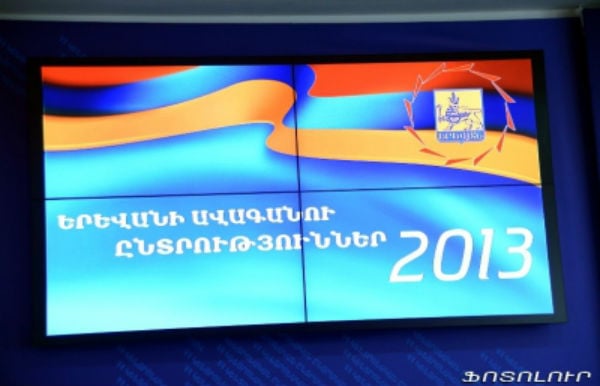
Another election took place on May 5, which on one hand, reaffirmed the new (mostly, old) make-up of Yerevan’s city council, and on the other hand, once again highlighted how not only people, but also the media are constantly restricted, “edited,” told what to do and what not to do.
The news media industry, for instance, serves petty, local interests and attaches itself to PR companies, financial schemes, political parties — moving further and further away from its public function.
Naturally, when political parties “fight,” it becomes reflected in the media outlets belonging to those parties.
This fight almost always occurs in unequal conditions (in terms of media coverage, being influential, and having a lot of advertising). Unequal conditions are spread also to media’s most defenseless group — journalists, who work at their daily task like laborers.
The Yerevan city council elections showed that coming into a collision are journalists who, no longer having a reference to mitigating circumstances, are forced to work in a political context, even in those cases when they are considered extremely professional and thus unbiased.
The journalist not engaged in self-deception undoubtedly will find it difficult to insist that she is unbiased, even if only because her work is published by a news outlet having a clear party affiliation. This affiliation might be openly declared, but it can also be disguised (which is most often the case), but in both cases it always exists, and it’s hanging over every journalist’s head like a Damocles’ sword.
There are now only a few news outlets in Armenia that, to a certain extent, are free from party pressure but they are mostly not influential and don’t attract a large audience.
Coverage of the May 5 elections was a serious trial for the remaining news outlets. Comparing the work of news sites and TV stations having various owners left one with the impression that people in Armenia are living on a land subject to the logic of several simultaneous measures.
It’s surprising, but the news media’s fight was even more heated than the fight of the political parties that own those news outlets. Political parties sometimes don’t even want to disseminate their official view, preferring to do that through the news outlet belonging to them (as it allows for some corrections and a retreat, if necessary).
On May 5, the state broadcaster’s channel H1, for example, reported that there were electoral violations, but the opposition committed them all. Kentron TV included reports about iniquities committed mainly by the ruling authorities, and Yerkir Media likewise broadcast several instances of violations at the hands of the ruling authorities, while Shant TV (and other channels) limited themselves mainly by publicizing official viewpoints.
Elections have become a frequent occurrence in Armenia recently, and many TV stations have lost their former enthusiasm, no longer getting worked up trying to procure exclusive content.
The exception is ArmNews, which has developed its own model of covering the elections, complete with music and an assortment of guests to spice up its viewpoint. The channel moderates news content and guests, taking into account the cue of the media holding company to which it belongs. That cue can be called “mildly pro-government” — unlike, say, H1’s cue, which disseminates the ruling authorities’ propaganda with brutal clarity.
If during the “marathon” organized on election day, say, ArmNews invites guests who are not clearly pro-government, the reporters hosting this marathon are protected by the government (in this case, the municipality). This is done even when the municipality has no need for dedicated people like journalists, but since the guests are unhappy with the municipality, the reporters consider it their duty to remind viewers also of the municipality’s good and efficient work. Actually, they could’ve done the opposite: invite pro-government guests and ask pointed questions. At the end of the day, everything depends on the moderator…
And the moderator, in turn, depends on political parties. And if a political party has something to say to another political party, it does so through willing reporters.
Generally, during this election much was said about journalists’ behavior, conduct, and rights, especially after several news outlets began to uncover reporters of other news outlets. Online and broadcast media connected to the ruling Republican Party of Armenia prepared media reports on “fake” journalists who identified themselves as Kentron TV and mardik.am correspondents but were really sent to polling stations by the Prosperous Armenia party.
This investigative journalism report, for example, provides many opportunities for reflection.
Every news outlet has the right to recruit journalists for one day and send them to do “black-market” work — to film the scene at polling stations. And if that news outlet doesn’t complain that its name is being used without its knowledge, then why does a news outlet having a completely different slant do that?
Perhaps raising one’s standing by pulling away the mask of a reporter of an opposing camp is enjoyable, but such reports leave viewers with uncertainty. And who are the judges, anyway?
In other words, how is it that a journalist reserves the right to speak about another journalist (though in reality not a professional) like she’s passing a sentence, if both, broadly speaking, do the same work — that is, “fishing” for information?
On May 5, it seems, journalists from opposing camps had made each other their target — filming, uncovering, and to a great extent interfering with each other’s work. Which is how warriors from different tribes acted in the Stone Age, getting in the way of each other’s hunting.
Nune Hakhverdyan
The views expressed in the column are those of the author's and do not necessarily reflect the views of Media.am.


Add new comment
Comments by Media.am readers become public after moderation. We urge our readers not to leave anonymous comments. It’s always nice to know with whom one is speaking.
We do not publish comments that contain profanities, non-normative lexicon, personal attacks or threats. We do not publish comments that spread hate.